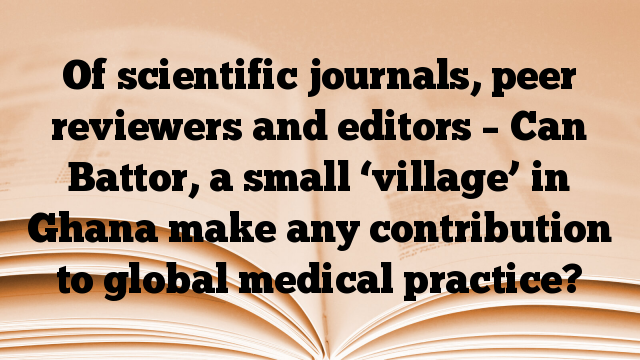
Friday, July 2, 2021.
Can anything good come out of Nazareth? Can Battor, a small ‘village’ in Ghana make any contribution to global medical practice?
Last year, we submitted a manuscript on our work on cervical cancer prevention in the North Tongu District to a journal, a good journal. Our aim was to share our experiences using our community-based approach with the scientific community, and hope that our relatively simple approach could be replicated in similar low resource settings around the world. The manuscript went through normal peer review, we were asked to make some changes on it which we did. Then there was a change in editor. The new editor, a Professor in a West African country, looked at the manuscript and rejected it.
He gave many reasons for rejecting the manuscript. What moved me was when he mentioned that ‘implementing a cervical cancer prevention programme is not as simplistic as we describe when it is properly done.’
I had to restrain myself from responding immediately but I responded after one of our papers was published in another journal, a journal more ‘friendly’ to practical field work in low resource settings. In my response, to him, I wrote something like this:
“We have demonstrated and continue to demonstrate in Battor, Ghana, that cervical cancer prevention can be simple. The WHO’s call to eliminate cervical cancer calls for innovations. ‘Complex solutions’ that work in advanced countries are not likely to work in low resource settings. We are convinced that the model we describe for cervical cancer prevention in our paper that your journal rejected is one of the major keys to reducing cervical cancer in low resource settings. I hope that editors like you will appreciate real innovations that need to be replicated across the world to achieve this elimination of cervical cancer (and other problems in low resource settings).”
I am not saying that every paper of ours (or others) needs to be published, but I think we need discerning journals and editors to bring out solutions fit for Africa and low income countries, not just ‘original research’ in academia. Fortunately, unlike years ago, there are currently many journals interested in practical field work in low resource settings, not just ‘original research’.
I do not publish to gain promotion in academia. I am motivated to publish to share experiences in solving problems. Some of these problems require simple solutions, not rocket science, and have been shown to work.
I am very persistent, almost impossible to discourage or dissuade in some areas. However, not many are like me. I wonder how many young practical and pragmatic field workers have been discouraged by comments on their work by peer reviewers and editors of journals. How many of them ended up not publishing their work that could have saved many lives? Or how many of them were ‘forced’ to publish their work in predatory journals?
Our manuscript will eventually be published in another journal. No, I will not send this or a similar manuscript to ‘Nature’ or ‘Science’, top, top journals that some top academicians compete to publish in, but it doesn’t mean that the simple solutions that we describe cannot impact on many lives, especially in low resource settings.
Dr. Kofi Effah is a gynaecologist and head of the Cervical Cancer Prevention and Training Centre in Catholic Hospital, Battor in the North Tongu District of the Volta Region of Ghana.

Responses to my piece ‘Of scientific journals, peer reviewers and editors – Can Battor, a small ‘village’ in Ghana make any contribution to global medical practice?’
Person 1
A Nigerian acquaintance had a paper rejected. 4-5 years later, he attended a conference and heard a presentation by the very professor who rubbished his work. And guess what? It was a rehash of his original work. His ideas had been stolen. He confronted the Professor publicly and called him names. That was the end of his career. He did locums from then on, not being able to nail down a substantive job here in the UK. The world of medicine can be a terrible place.
Keep going. Its the women of Ghana who appreciate what you and the team are doing.
[…] Follow up: As I always say: Time will tell. […]